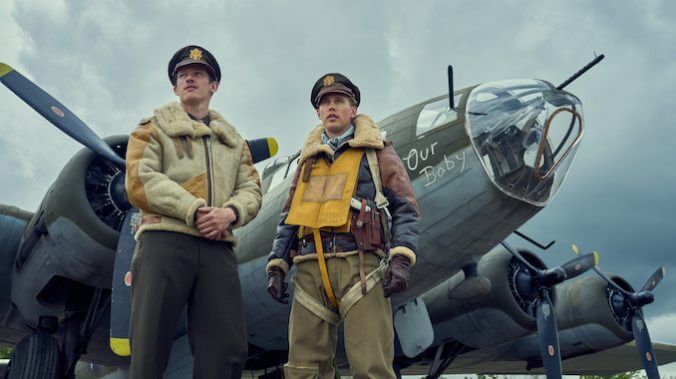Masters of the Air Belly-Lands the Plane and Offers a Stunning Conclusion to the Band of Brothers Trilogy
Photo Courtesy of Apple TV+
“This hasn’t gone exactly as we thought, has it?”
This is what Maj. John “Bucky” Egan (Callum Turner) says to his best friend, Maj. Gale “Buck” Cleven (Austin Butler), near the end of the World War II drama, Masters of the Air. Egan is referring to the duo’s predicament where, thanks to the Nazis, they’re incapable of doing what they do best: fly B-17 bombers.
However, Egan’s sentiment could also apply to the audience, as the series feels like two oddly shaped Lego pieces that eventually fit well together. The first half of Masters of the Air has more in common with a Shakespearean tragedy (full of sound and fury signifying not much) until a mid-season course correction rights the plane, allowing it to touch down to an emotional and satisfying conclusion.
Masters of the Air is based on the 2006 book of the same name written by historian and biographer Donald L. Miller. Produced by the same team as Band of Brothers and The Pacific (Steven Spielberg, Tom Hanks, and Gary Goetzman), the series follows the actions of the 100th Bomb Group and acts as the final piece to a compelling World War II trilogy.
Much like its predecessors, Masters of the Air is massive in scope, scale, and ambition. Watching B-17 Flying Fortresses launch from an airfield 90 miles north of London to perform bombing runs on German targets is riveting. This series features some of the most visually stunning action sequences I’ve ever seen on television. Forget the dragons from Game of Thrones, the bombing missions in Masters of the Air are absolutely INSANE (a word I literally wrote in all caps in my notes for the show).
Bombing raids start out eerily quiet then gradually build to a terrifying cacophony as American aviators fend off anti-aircraft flak and enemy fighters to complete missions attacking enemy submarine bases, factories, and other military targets. The fortitude demonstrated by characters onscreen, with most portraying real life 100th Bomb Group members, is perfectly exemplified in a mid-season bombing mission.
In October 1943, the 100th Bomb Group launched a bevy of planes headed for Germany. The only plane to return was the one flown by Robert “Rosie” Rosenthal (Nate Mann), who managed to make it back to England despite losing two engines, his intercom, and his oxygen systems. Seeing an actual event reenacted, a tragedy that cost 120 American lives, makes you feel the weight of the sacrifice so many people made to win the war.
Adding to Masters of the Air’s feeling of authenticity are a number of historical tidbits sprinkled throughout. I had no idea the Norden Bombsight was one of the most secretive projects the allies worked on. The reason for the dangerous daytime American bombing strategy in Europe and even why aviators wear the bomber jackets they’re famous for are just a few of the bits of knowledge sprinkled throughout the series.
-

-

-

-

-

-

-

-

-

-

-

-

-

-

-

-

-

-

-

-

-

-

-

-

-

-

-

-

-

-

-

-

-

-

-

-

-

-

-

-








































